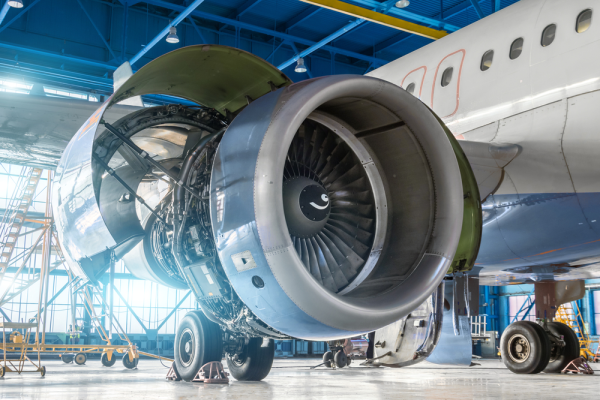
Industrial companies have often lagged behind when it comes to cybersecurity. Older industrial operations primarily relied on manual or analog control that didn’t expose operations to cyber risks. However, for a modern aerospace manufacturing business to be successful, it has to rely on digital systems that gather data, control operations, and accelerate production. These same systems can present risks if not properly secured. With artificial intelligence in aerospace, it’s possible to protect your company and complete a digital transformation.
The Role of Cybersecurity in Aerospace Manufacturing
Protecting Your Operations
When more of your operations are connected to the internet, the risk of a cyberattack increases. This is unfortunately inevitable. However, that doesn’t mean you should shy away from digitizing your operations. The benefits from going digital far outweigh the potential risks. Furthermore, it’s possible to mitigate risks significantly with the right tools and technology. What risks should you be aware of, and what steps can you take to secure your operations while undergoing a digital transformation?
The biggest risk to your operations is downtime due to a cyberattack. A data breach or malware infestation could force you to shut down systems. The most common event is a data breach that seeks to extract customer information or intellectual property from your company. A Deloitte report found that 39% of industrial businesses experienced a breach attempt in the last 12 months. Cybersecurity tools powered by artificial intelligence in aerospace can limit the damage and prevent attacks entirely.
Preventing Data Breaches
Data breaches can happen to any business. In most cases, businesses with large customer databases are targeted in order to extract as much data from as many consumers as possible in one attack. This is why many of the highest profile data breaches have targeted online services or retailers that interact with millions of people. However, that doesn’t mean that an aerospace manufacturer has little to worry about. Your company still has data that could be valuable to an attacker.
The first step to securing data is encryption. Ensuring that all your data transfers use encryption will prevent someone from stealing data as it travels. Secondly, control user access to data. Phishing attacks that trick users into giving up their access credentials are the most common data breach vector. Using two-factor authentication, training your staff, and regularly changing passwords can mitigate this risk. Artificial intelligence can detect unusual logins and request additional verification for added security.
Avoiding Malware Infections
Malware can also be used to gain access to your data, or even cripple your operations. For example, ransomware became the primary source of cyberattacks in 2021 and today represents over two thirds of attacks. Ransomware, once activated, will encrypt your file system and demand a ransom, which often does not actually result in the liberation of your data if paid. Ransomware is most commonly distributed through email attachments, which can be detected and filtered out by AI tools.
The best way to avoid malware is to have your data in the cloud. When you keep files on local servers, any connected user that activates malware could infect all of your connected systems. By using the cloud, data is kept safe in environments that prevent malware from being executed.
Ensuring Reliable Data Restoration
Although artificial intelligence and cybersecurity training can prevent a great deal of attacks, it’s always wise to have a backup plan. Does your aerospace manufacturing company have a protocol in place so that your entire team knows what to do if an attack occurs? The simplest response plans are the ones that are best executed, and one of the easiest ways to recover from an attack is to reset your systems and restore your data.
AI-driven backup software can determine which files need to be backed up most often based on importance and frequency of usage. You can also manually determine how often backups should occur. In the event of a breach or malware attack, you could briefly shut down operations and restore your systems overnight. That’s how you perform better than the industry average recovery time of 3 weeks or more.
Defending Intellectual Property
Data security is of paramount importance in the aerospace industry. Proprietary designs represent hundreds of millions of dollars in R&D expenses. Major aerospace companies won’t work with suppliers whose cybersecurity track record is spotty. Industrial espionage in the aerospace industry is a very real threat. A new attack named AeroBlade was discovered just a few weeks ago, and the full extent of its damage has yet to be determined.
By showing commitment to cybersecurity, you put your business in a more favorable position to secure contracts from larger organizations. You also increase the likelihood of winning government orders for confidential projects.
Securing Your Hardware
In rare cases, your industrial hardware could be attacked as well. An industrial control system (ICS) can automate much of your production and provide useful data that can be used to monitor your hardware constantly. However, it can also open up your hardware to potential attacks. Stuxnet proved that these types of attacks are possible.
Fortunately, artificial intelligence can defend your systems by monitoring operating parameters and spotting deviations. This same technology enables predictive maintenance as well, so it will provide benefits for your operations while simultaneously securing them against targeted attacks.
Artificial Intelligence in Aerospace Can Secure Your Systems
The more you expand your digital footprint, the more difficult it is to monitor your entire operation manually. Artificial intelligence, in contrast, has virtually limitless potential to protect your company as it scales up. To implement AI and make your entire business more secure, you’ll need to digitize your business and adopt cybersecurity best practices.
Contact SAAB RDS to learn how we can help you complete a safe digital transformation and protect your company.
